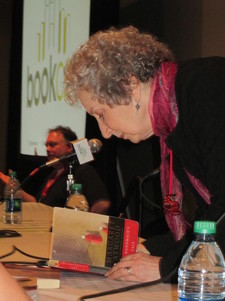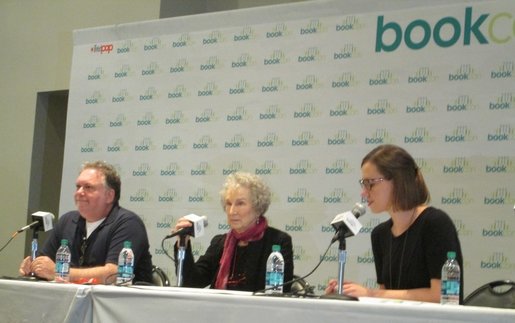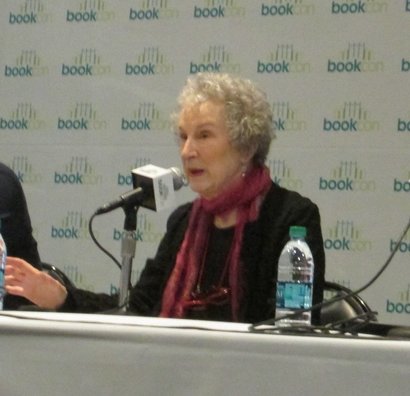|
This panel was the main reason I decided to go to BookCon in the first place. Margaret Atwood is one of my literary heroes. It's hard to find something she hasn't excelled at. She's a poet, she's a novelist, and she's a voice for Canadians, feminists and activists alike (although she would probably be the first to deny at least one out of three of those, probably two). And she has a wicked sense of humor to boot. My sister and I were both born in the north, and about half our extended family still call it home. Our grandmother in particular was what I feel epitomizes Canada to me - she set a formal table, had afternoon tea, and could say outrageously funny things in the most unfailingly polite way. Both my sister and I were lucky enough to attend Ms. Atwood's panel, and both of us at the end of it turned to each other and said, "Grandma." Ms. Atwood had the audience laughing at her deadpan and outrageous humor. The official title of the panel was: "The Handmaid's Tale: Margaret Atwood and Showrunner Bruce Miller from the New Series on Hulu."  Like my other posts about BookCon, I have the standard disclaimer: When I take notes at an event, I write it out longhand in a notebook, and I'm not always the fastest transcriber around. I paraphrased the questions/answers that I didn’t manage to write down verbatim, but I tried to stick as closely as possible to what was asked/answered. Anything in quotes is straight out of the horse's mouth. All questions were asked by the moderator, Madeleine Crum, with the exception of the audience questions at the end. Question: The Handmaid's Tale was recently re-released with a new introduction. What deterred you from the science fiction genre and what made you decide to eventually write it? Margaret - "1984 had a lot of cleavage and leering on the cover" to attract readers in the 50s. She still has her original copy from when she was a kid. She was born in 1939 when WWII was beginning, so it was a formative experience for her. There were lots of comic books and radio drama, but no TV. "[I] grew up in the woods and was not properly socialized." She didn't care if no one liked what she read. "My dad liked to read sci-fi because he thought it was funny. ... I liked them, but I didn't feel like I could write them." Three things made her do it:
Question: What other historical references other than the Bible influenced The Handmaid's Tale? Margaret - Everything in it is based on real events. Question: How and when did you both get involved in the adaption? Bruce - "[I] read [the] book in college ... attracted to it as a work of literature ... the fact she could maintain ... resistance, sense of self," etc. They were looking for a female show writer but he really wanted the job and they "worked it out." Margaret said, "We can fix that," when he said, "I was a boy." [Audience laughed at this.] "Unfortunately, all the things that Margaret mentioned in the book can still be found happening around the world today." Question: How is the book relevant to [U.S.] politics today? Bruce - He started writing episodes before the primaries even began, and was filming on election day. Margaret - "[No one's] a bad guy in their own mind. ... There are very few people who think they're a bad guy." You're "only as good as your villain." Question: What about activism? Margaret - "First of all, I'm not a real activist ... they get paid." Then she joked about how she doesn't really have a job, so she can't get fired - she's just a writer. In a totalitarian society, she'd just get shot. She's still here, so we're not there yet. Bruce - Feels out of his depth. He's a news junkie, but doesn't feel adept enough to comment. At this point, the conversation took an unexpected turn from politics to perception. The way it came out was talking about advertising and feminine products, and, as Ms. Atwood put it, how euphemism can get people in trouble. Margaret - Euphemisms are "the beginning of surrealism." Question: There are some differences between the book and the show. Why did you choose to get more in the other characters' heads on the show? Bruce - "Just decided to follow my curiosity. ... All the satellite events that happen all go back to her [Offred]." Margaret - "In the book, they're all open questions." Question: Another difference is that there is some climate change in the book, but it's much bigger in the show. People are more conscious of it. Why? Bruce - You can't make Gilead into everything you hate. If they're trying to combat infertility, they're trying to protect the environment. Question: Are there any thematically related books or TV shows you'd recommend? Margaret - The Rise of the Nazi Party. [TV mini-series.] Bruce: The Rise and Fall of the Third Reich. [Book.] AUDIENCE QUESTIONS Question: Where do we go from here? We're heading towards totalitarianism.
Margaret - "I'm not really a visionary. I'm not a prophet. Sometimes people have to live their dream" even if the dream isn't what they expected. In the state of Texas, it's impossible to have abortions now. "It really is a form of slavery to force women to have children they can't afford." She's waiting for the lawsuits of women suing to have the state pay for their unwanted children. Question: One of the things the audience member asking the question always found the most creepy was the epilogue in the book. It's the far future looking back, and it says that we can't judge the oppressors for their actions, since we aren't them. Margaret - "If you read history books, you will find those kind of things." And it's true - it's hard to judge a time, since we weren't there. Bruce - "The writing staff - we're incredibly judgy." [Got a laugh from the audience.] Question: Human beings say that they would never do something like this. At what point do we know we're at that turning point? Margaret - "You can't know ... the future doesn't exist. It's an infinite number of possible futures." Question: Should everyone read the book if they've only watched the show? Margaret - "Telling everyone to read my book sounds incredibly self-serving, doubly so because I'm Canadian." [Got a laugh from the audience.] "You're never there in the room at the same time someone's reading it as when you're writing it." So just write it - no one will read it unless you give it to them. Bruce - "I tend to write things that I just can't not write." And that's a good note to end on - writers write the stories that must be told, no matter what. Even if it gets them in trouble. All you have to do is reach one reader, and you've succeeded. NEXT IS THE LAST BLOG POST ABOUT BOOKCON: Part 4 will be about Transforming a Bestseller onto the Silver Screen: the Book to Film Experience.
0 Comments
Leave a Reply. |
Who the heck is Alison McBain?I am a freelance writer and poet with over two hundred short pieces published in magazines and anthologies. Check out my 2024 writing challenge to write a book a week at Author Versus AI. For more info, please check out my "About Me" page. © Alison McBain. All rights reserved
Archives
July 2024
|






